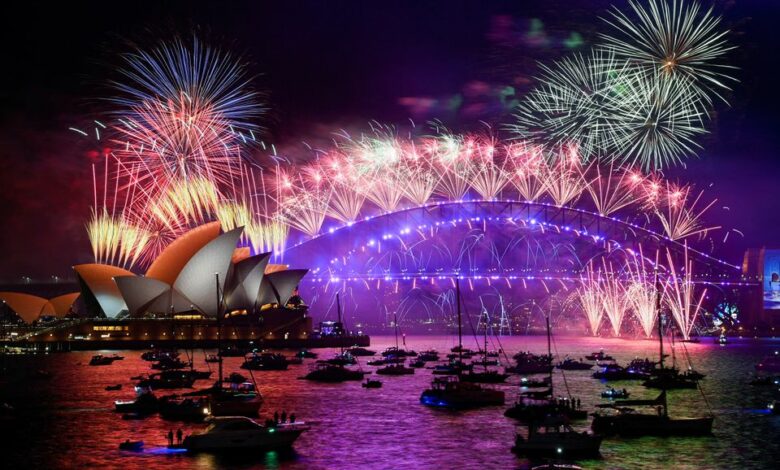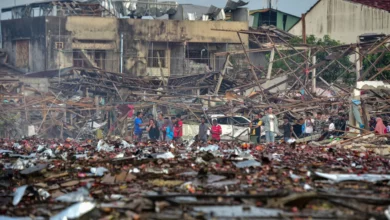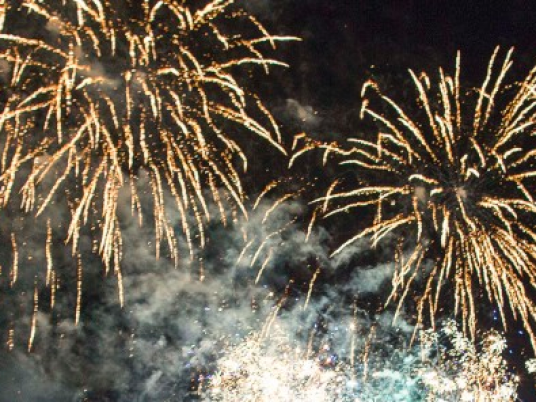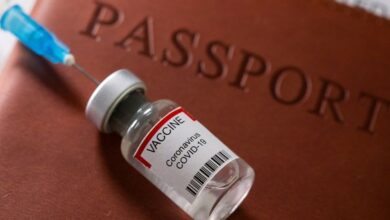
SYDNEY/CAPE TOWN, Dec 31 (Reuters) – Australians bade farewell to 2021 with a traditional fireworks display over Sydney harbour as good news from South Africa – the first country to pronounce itself past its Omicron wave – brought hope for a joyous New Year.
Thanks to Omicron, the New Year began its annual roll from East to West quietly – with no official firework display in Auckland, New Zealand.
Sydney opened the global celebration in vintage style, with its usual spectacular pyrotechnics reflected in the harbour below the Sydney Opera House. But there would be no displays above many of the world’s traditional landmarks, with fireworks called off over Paris’s Arc de Triomphe, London’s Big Ben and the Petronas Towers in Kuala Lumpur.
The golden ball was due to drop at New York’s Times Square, but the crowd shouting out the countdown of the year’s exit would be a quarter the usual size, masked up, socially distanced and with vaccine papers in hand.
Still, South Africa, which first raised the alarm about the new fast-spreading coronavirus variant, gave the world one of the last big good surprises of the year, announcing that the Omicron wave had crested without a huge surge in deaths. It abruptly lifted a night time curfew, allowing celebrations to ring in 2022.
“I’m pretty sure it’s going to be amazing. I’m just hoping that Cape Town goes back to the old Cape Town that we all knew about,” said Michael Mchede, manager of a Hard Rock cafe by the white sands of Cape Town’s Camps Bay Beach, thrilled to find himself getting the place ready to host an unexpected bash.
“I’m excited that you don’t have to go back to the hotel. You can roam around on the beautiful beach over here, and let’s see if it brings a party!” said tourist Jochem Verbunt, who said his hope for 2022 was “that corona will be gone”.
HORRENDOUSLY BAD
The sudden arrival of Omicron has brought record-setting case counts to countries around the world. Although deaths have not risen as fast, leaving hope the new variant is milder, many countries have reimposed restrictions to prevent healthcare systems from being overwhelmed. Even where gatherings are permitted, many people have chosen to stay home.
At Le Querida, a restaurant serving grilled octopus and stuffed peppers in Madrid’s Pozuelo neighborhood, just four tables out of two dozen were booked for New Year’s Eve. The place had been nearly packed nightly just a few weeks ago before Omicron wiped out business, said head waiter Juan Lozano.
“We all thought… we’d be able to make some money and pay off many things that are overdue,” he said. “The outlook is horrendously bad.”
Regional president Isabel Diaz Ayuso has promised New Year’s Eve celebrations at 60% capacity: “If Madrid is not free, it is not Madrid,” she declared. Revelers will see in the New Year eating 12 grapes in time with the chimes of the bells in the old post office building. Around 1,500 people turned out for a dress rehearsal the night before.
“It’s a time to be together, to mark a new year and feel that excitement when the bells ring, share chocolates and sweets,” said Wendy Garcia, who brought her seven-year-old son to the dry run to avoid the big crowd at the main event.
New York’s Times Square celebration, with just 15,000 spectators instead of the usual 55,000 or so, will still be a big improvement on last year’s audience of just a few dozens. In Los Angeles, the countdown party in Grand Park was called off. Rapper LL Cool J had to step down as a headliner on ABC’s New Year’s Eve telecast after testing positive.
At a Party City shop in Texas, Dana Fenner’s hands were full of hats and horns for a low-key party she was planning at home with her husband and three kids.
“Normalcy. I want everything to get back to normal,” she said.
Global coronavirus infections hit a record high over the past seven-day period, with an average of just over a million cases detected a day worldwide between Dec. 24 and 30, some 100,000 up on the previous peak posted on Wednesday, according to Reuters data.
Still, in Sydney queues were forming in the morning at the best vantage points to watch the fireworks over the harbour, an annual staple of television broadcasts around the world as one of the first big cities in the world to welcome each new year.
Prime Minister Scott Morrison told Australians to enjoy the evening. Dominic Perrottet, premier of New South Wales state which includes Sydney, said he took heart because hospitals were coping with Omicron: “Our position remains incredibly strong,” he told reporters.
Elsewhere in Asia, celebrations were mostly scaled down or called off. In South Korea, a traditional midnight bell-ringing ceremony was cancelled for the second year and authorities announced an extension of stricter distancing rules for two weeks to tackle a persistent surge in infections.
Celebrations were banned in Tokyo’s glittering Shibuya entertainment district, and Prime Minister Fumio Kishida took to YouTube to urge people to wear masks and limit numbers at parties.
China, where the coronavirus first emerged in late 2019, was on high alert, with the city of Xian under lockdown and New Year events in other cities cancelled.
Authorities in the Indonesian capital, Jakarta, planned to close 11 roads that usually draw big crowds for New Year. Malaysia banned big gatherings nationwide and cancelled the annual Petronas Twin Towers fireworks display.
Secretive North Korea promised midnight fireworks at Kim Il Sung Square in its capital, Pyongyang.




